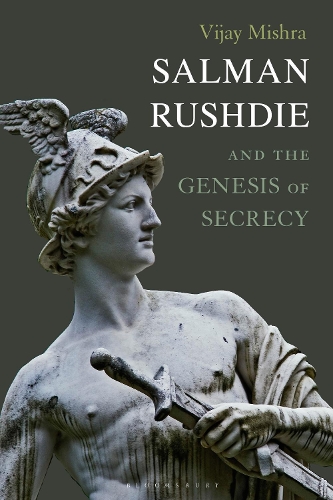
Salman Rushdie and the Genesis of Secrecy
(Paperback)
Available Formats
Publishing Details
Salman Rushdie and the Genesis of Secrecy
By (Author) Vijay Mishra
Bloomsbury Publishing PLC
Bloomsbury Academic
26th November 2020
United Kingdom
Classifications
Tertiary Education
Non Fiction
Literary studies: postcolonial literature
823.92
Physical Properties
Paperback
264
Width 156mm, Height 234mm
376g
Description
Salman Rushdie and the Genesis of Secrecy is the first book to draw extensively from material in the Salman Rushdie archive at Emory University to uncover the makings of the British-Indian writers modernist poetics. Simultaneously connecting Rushdie with radical non-Western humanism and an essentially English-European sensibility, and therefore questions about world literature, this book argues that a true understanding of the writer lies in uncovering his genesis of secrecy through a close reading of his archive. Topics and materials explored include unpublished novels, plays and screenplays; the earlier versions and drafts of Midnights Children and its adaptations; understanding Islam and The Satanic Verses; the influence of cinema; and Rushdies turn to earlier archives as the secret codes of modernism. Through careful examination of Rushdies archive, Vijay Mishra demonstrates how Rushdie combines a radically new form of English with a familiarity with the generic registers of Indian, Arabic and Persian literary forms. Together, these present a contradictory orientalism that defines Rushdies own humanism within the parameters of world literature.
Reviews
This new book provides an in-depth study of all of Rushdies published fiction, and it is enriched by Mishra's access to the voluminous Rushdie archive housed at Emory University. One learns about Rushdies education, his literary enthusiasms, and the terrible drama that unfolded after the publication of Satanic Verses (1988)the infamous fatwa that threatened his life during the ensuing ten years and changed the course of Rushdies life and work. Throughout, the discussion is informed by literary theory, and figures as distant as Freud and Marx are referenced along with more contemporary thinkers such as Derrida and Edward Said. Most fascinating is the chapter on the archival holdings relevant to Rushdies major work Midnights Children (1981). Summing Up: Recommended. * CHOICE *
Through its breadth, depth, and urgency, Salman Rushdie and the Genesis of Secrecy is sure to instill curiosity about, and warmth toward, Rushdie and his works in a new generation of scholars ... This is an insightful and compelling text with much to say to scholars of literature, culture, and history. * Modern Fiction Studies *
Salman Rushdie and the Genesis of Secrecy brings together Mishras meticulous research on the writer with astute critical, theoretical and conceptual analysis ... Offering detailed and sustained analyses of Rushdies influences, Mishra manages to wrestle Rushdie away from the postcolonial stranglehold to open up an enlarged frame of vision of his work. * The Review of English Studies *
At last: a properly researched, profoundly erudite book on Rushdie that gets the usual labels 'Indian', 'postcolonial', 'postmodern' off his back. * Graham Huggan, Professor of Commonwealth and Postcolonial Literatures, University of Leeds, UK *
This far-reaching, stimulating study explores a rich array of new approaches to one of the most significant writers of our time, Salman Rushdie. The leading Rushdie scholar Vijay Mishra builds on exhaustive reading of the Emory Rushdie archive to uncover realist, modernist, postmodern, and magic realist as well as the more usual postcolonial approaches to the writer. A must-read for all readers of Rushdie, this book has all the makings of a critical classic. * Elleke Boehmer FEA, Professor of World Literature, University of Oxford, UK *
Vijay Mishras dedication to the Salman Rushdie archive represents a significant contribution to the study of the postcolonial novel. He is a meticulous reader of texts and pre-texts and therefore has a fine grasp of the of the intellectual histories and cultural lineages of the Rushdie oeuvre. The finished work is always renewed and refreshed by a study of the crucible of its making. Students of Rushdies remarkable novels will profit from keeping company with Mishras prolific insights. * Homi K. Bhabha, Professor of the Humanities, Harvard University, USA *
One of the most significant paperbacks to have been released in humanities publishing in 2021 ... a compelling and thoroughly progressive book. * Media International Australia *
Author Bio
Vijay Mishra is Professor of English and Comparative Literature at Murdoch University, Australia. He has two doctorates, the first from the Australian National University in Medieval Indian Poetry and Aesthetics, the second from the University of Oxford in 18th-Century English Literature. He has written widely on literary and cultural studies, including Annotating Salman Rushdie: Reading the Postcolonial (2018), What Was Multiculturalism: A Critical Retrospective (2012), The Literature of the Indian Diaspora: Theorizing the Diasporic Imaginary (2007), Bollywood Cinema: Temples of Desire (2002), Devotional Poetics and the Indian Sublime (1998), The Gothic Sublime (1994) and Dark Side of the Dream: Australian Literature and the Postcolonial Mind (with Bob Hodge, 1991).
